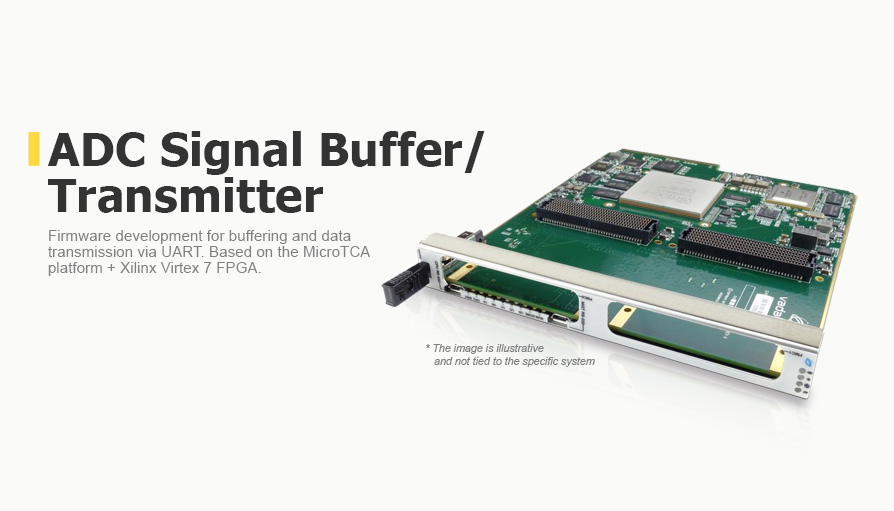Software Development for ADC Signal Buffer/Transmitter
Client
A German integrator of high-performance solutions.
Challenge
To develop and implement software for buffering (> 1 M sample) and data transmission via UART from the system buffer (DDR3 on the AMC525 board).
Solution
Hardware Design
The solution was implemented on the following MicroTCA platform:
- AMC525 x 1 pcs
- Xilinx Virtex 7 xc7vx690t FPGA
FMC 231 ADC x 1 pcs
We used a laptop connected to the system via UART to check the data on the FPGA-based AMC (Advanced Mezzanine Cards) carrier board.
Software Development
We were responsible for the FPGA programming of the AMC cardboard. Functionally, the developed firmware consisted of the following components:
- a module for configuration and data acquisition FMC231 with ADC ADS54J60;
- MicroBlaze, a soft microprocessor core with connected IP UART;
- IP to work with DDR3 (MIG);
- an AXIMM — AXIS conversion module.
An interaction interface was implemented between AXI4S modules. Since working with memory required the use of the AXI4MM interface, we created an interface conversion module using HLS.
Also, our software engineers created a system for accumulating analogue signals in DDR3 memory and then transmitting data via UART to a higher-level device. During the development with JESD 204b, HLS, and MicroBlaze, we solved the following tasks:
- connection of an external memory;
- Microblaze connection;
- creation of the AXIS — AXIMM interface converter using HLS;
- FMC231 ADC setting;
- writing ADC data to the external memory and reading from it with a subsequent transfer to UART.
Business Value
Our customer has received all the necessary software for the system to buffer and transmit large volumes of data (>1 M sample) through the UART interface. The software was carefully developed and thoroughly tested to ensure optimal performance and reliability. Using the DDR3 memory as a buffer, we could transmit data without compromising speed or accuracy.
Our client can use the ADC signal buffer for various industries that rely on the seamless and efficient transmission of large volumes of data.
This is one of several projects that we have implemented with MTCA, an open standard for high-performance modular embedded systems. With MicroTCA, you get high scalability and a compact design that reduces your time to market. Read more: How We Develop Custom AMC Boards and Integrate MicroTCA



















